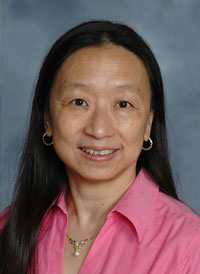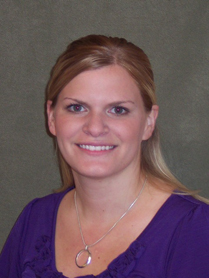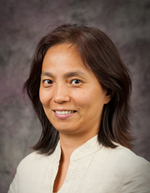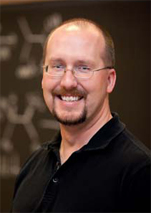Below you will find a list of Kansas State University faculty members who volunteered to host a KS-LSAMP student in their research lab during Summer 2015. We appreciate their willingness to participate in our program! THANK YOU!!
 Dr. Eleanor Sayre
Dr. Eleanor Sayre
Physics – Physics Education
Dr. Sayre has several research interests in the area of physics education research. Some of her lab’s specific interests include:
- Improving and extending the theoretical bases for physics education research.
- Investigating the interplay between physics and mathematics understanding.
You can read more about Dr. Sayre here: https://www.phys.ksu.edu/people/tt-faculty/sayre.html
The Physics Department at Kansas State University has faculty members that specifically focus their efforts on improving physics education. This group is known as the Physics Education Research Group. You can read more about this group by following this link: https://perg.phys.ksu.edu/
You can read more about Dr. Sayre’s lab by following this link: http://www.zaposa.com/home2/
 Dr. Philip Ugorowski
Dr. Philip Ugorowski
Mechanical and Nuclear Engineering – Nuclear Engineering
Dr. Ugorowski has 15 years of applied physics experience in the field of radiation detection development. Some of Dr. Ugorowski’s recent work focuses on replacement neutron detection material. He is currently a researcher in the Semiconductor Materials and Radiological Technologies (SMART) Lab.
You can read more about Dr. Ugorowski and the SMART Lab here: http://www.mne.ksu.edu/research/centers/SMARTlab/people/Research%20Scientists/Dr.%20Philip%20Ugorowski/view_person
 Dr. Robert DeLong
Dr. Robert DeLong
Anatomy & Physiology
Dr. DeLong’s lab focuses on studying how nanomaterials effect structure-function delivery of nucleic acids and proteins. His research focuses on targeting RNA with novel nanoparticles designed to interrupt cancer gene expression.
You can read more about Dr. DeLong here: http://nicks.ksu.edu/people/delong/index.html
 Dr. Tandalayo Kidd
Dr. Tandalayo Kidd
Human Nutrition
Dr. Kidd’s areas of specialization are nutrition and physical activity. She is an associate professor in the Department of Human Nutrition. In addition to having her PhD in Human Nutrition, Dr. Kidd is also a registered dietician.
You can read more about Dr. Kidd: http://www.he.k-state.edu/hn/people/faculty/kidd/
Research in Dr. Lee’s lab is focused on protein trafficking. An example of protein trafficking is when a newly made protein is delivered through cellular pathways to reach its final destination for proper functioning. Membrane proteins can also be engulfed in a vesicle and taken within a cell for degradation. Dr. Lee’s labs is interested in intracellular protein transport in general. They have identified a regulator of the COPI-mediated retrograde transportation from the Golgi to ER. In addition to its basic research focus Dr. Lee’s lab is also interested in the mechanism behind transport defects in disease.
You can read more about Dr. Lee here: http://www.k-state.edu/biology/people/tenure/lee/
Her lab webpage can be found here: http://www.k-state.edu/leelab/Lee_Lab/Research.html
Dr. Rafferty’s research focus is in synthetic organic chemistry, drug discovery, medicinal chemistry, probing the transport of small molecules across complex cellular barriers, and the development of personalized cancer therapeutics.
You can read more about Dr. Rafferty’s work here: http://www.k-state.edu/chem/people/grad-faculty/rafferty/
You can learn more about Dr. Rafferty’s lab here: http://www.k-state.edu/chem/people/grad-faculty/rafferty/lab/index.html
Dr. Roelofs does work related to the proteasome. This is a complex in the cell that is responsible for protein degradation (removal).
The ability to degrade specific proteins is essential for many cellular events, such as cell cycle progression, DNA repair, and many signal transduction pathways. In eukaryotes a large group of proteins is involved in selecting proteins destined for degradation by marking them with an ubiquitin tag. Most of these ubiquitinated proteins are degraded by a complex protease, the proteasome. Failures in the Ubiquitin-Proteasome System (UPS) have been associated with neurodegenerative diseases, cancers and other human diseases.
One project in his lab focuses on how the proteasome assembles and in what way chaperones assist in this process. His lab uses yeast, also called Saccharomyces Cerevisiae, to study the proteasome and the processes associated with it. Studies include biochemical and cell biological methods (including fluorescent imaging techniques) as well as yeast genetics.
You can read more about Dr. Roelofs here: http://www.k-state.edu/biology/people/tenure/roelofs/
Information related to Dr. Roelofs’ lab can be found here:
http://www.k-state.edu/roelofslab/Roelofs_Lab/Home.html
 Dr. Peying Fong
Dr. Peying Fong
Anatomy & Physiology
Dr. Fong conducts research related to thyroid hormones. These hormones are regulators of every vital system in the body. Aside from their important roles in pre- and early post-natal development, thyroid hormones regulate basal metabolic rate, cardiac contractility, blood pressure and pulse throughout every stage of life. Overt thyroid dysfunction produces life-threatening consequences. Slight disturbances in the thyroid influence prognoses in cardiovascular and end-stage renal disease, conditions that have become endemic in the industrialized world.
Dr. Fong’s lab is named the Membrane Transport Physiology Laboratory. Her lab aims to understand how membrane transporters and channels interact to promote proper function of thyroid hormones.
You can read more about Dr. Fong here: http://www.vet.k-state.edu/education/anatomy-physiology/faculty-staff/faculty/fong/ and http://www.vet.k-state.edu/education/anatomy-physiology/faculty-staff/faculty/fong/methods.html
Dr. Fong’s lab webpage can be found here: http://www.vet.k-state.edu/education/anatomy-physiology/faculty-staff/faculty/fong/lab-personnel.html
 Fred Hasler
Fred Hasler
Architectural Engineering
Mr. Hasler has a background in indoor lighting systems design and geothermal heat pump design.
You can read more about Mr. Hasler here: http://www.are-cns.ksu.edu/people/faculty/fredhasler/
Dr. McLaurin’s research examines the surfaces and interfaces of nanomaterials from an inorganic chemistry perspective. This research allows her to gain insight into the structure and function of nanomaterials on a nanoscale level.
You can read more about Dr. McLaurin here: http://www.k-state.edu/chem/people/grad-faculty/mclaurin/
 Dr. Cassandra Jones
Dr. Cassandra Jones
Animal Science & Industry
Dr. Jones’ research area includes evaluating the effects of ingredients or feed processing technologies on safety and animal nutrition.
You can read more about Dr. Jones here: http://www.grains.k-state.edu/people/faculty/jones/



